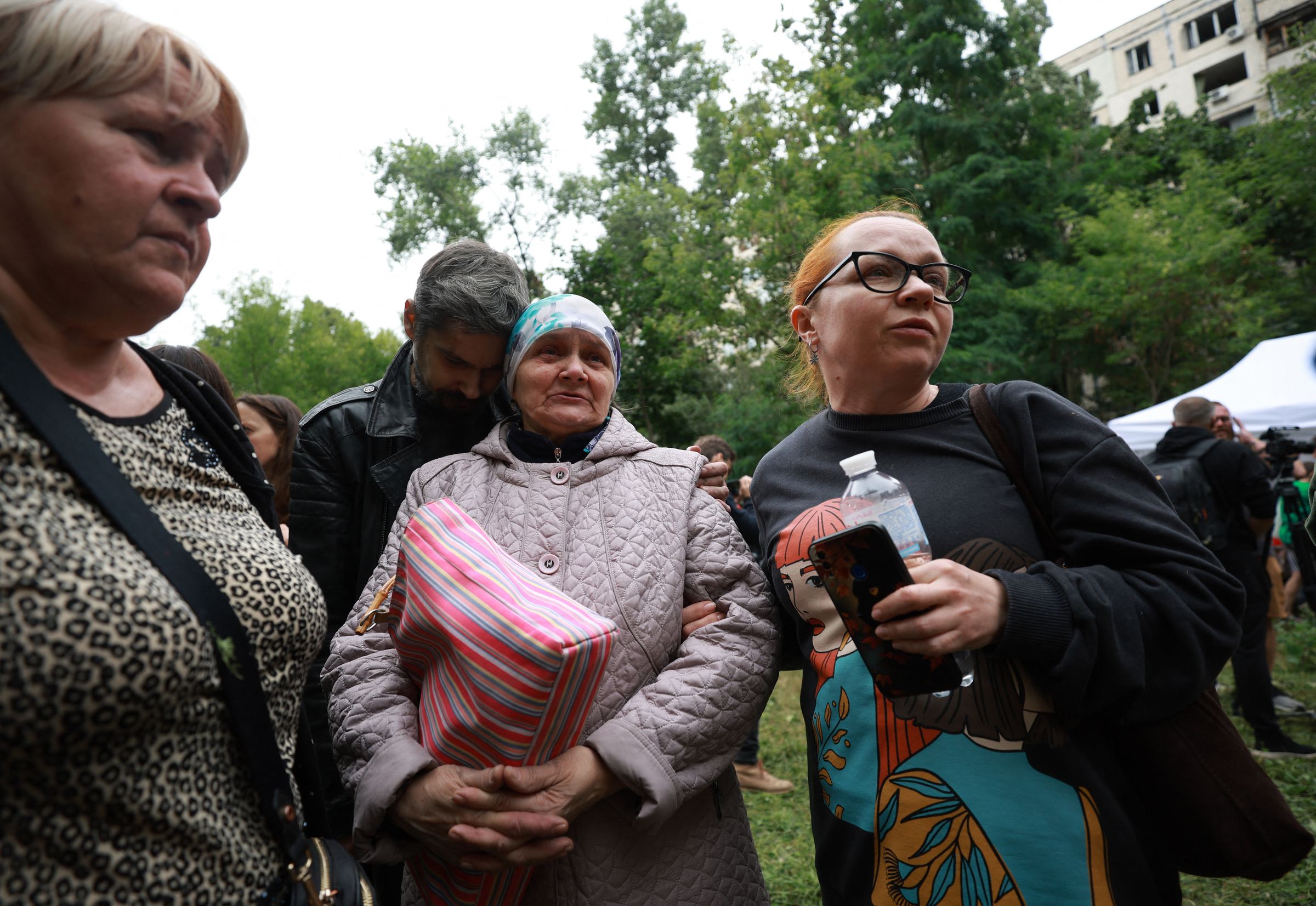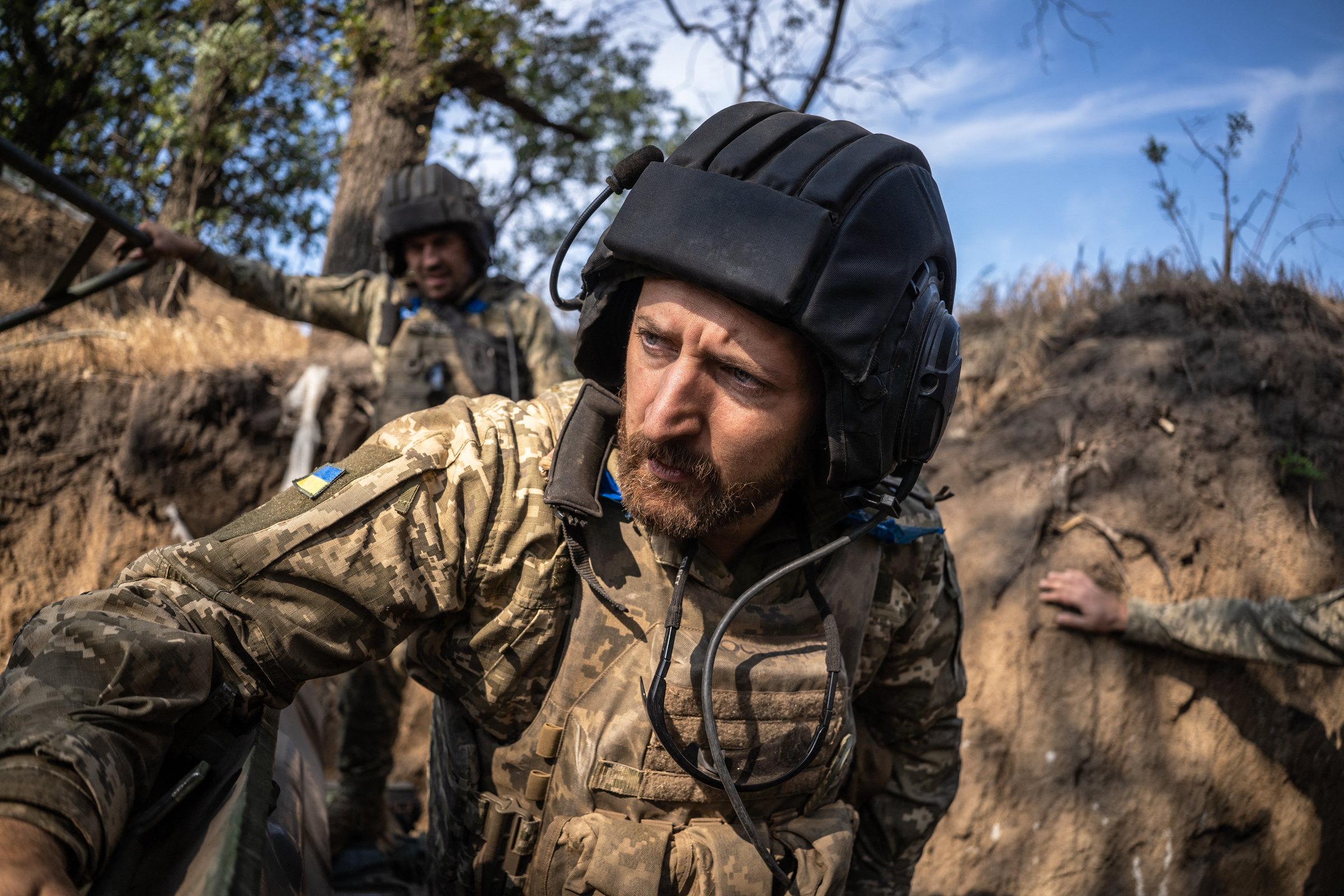President Donald Trump and his Russian counterpart, Vladimir Putin, are scheduled to meet on 15/8 in Alaska. This will be the first summit between the US and Russian leaders since the outbreak of the war in Ukraine.
The summit is hoped to be a turning point, pushing Russia towards an agreement on Ukraine and ending the three-year conflict. However, many experts and Ukrainians are skeptical, even worried that Kyiv will face further disadvantages.
"There will be no miracles or peace agreements, and Putin will try to convince Trump that Ukraine doesn't want peace," Taras, a 32-year-old Ukrainian veteran, told Al Jazeera.
 |
Residents at an apartment building hit by an attack in Kyiv, Ukraine on 31/7. Photo: AFP |
Residents at an apartment building hit by an attack in Kyiv, Ukraine on 31/7. Photo: AFP
Taras fears Putin might be playing to Trump's desire to cultivate a "peacemaker" image. The meeting is likely part of Putin's tactic to avoid new US economic sanctions while continuing to advance in eastern Ukraine.
Deep State, an analytical group linked to the Ukrainian Ministry of Defence, released a map on 11/8 showing Russian forces penetrating the defensive line north of the Pokrovsk stronghold in Donetsk province, advancing into the residential areas of Kucheriv Yar, Zolotyi Kolodiaz, and Vesele.
Russian forces are reportedly consolidating their positions for complete control of these areas, preparing for a new offensive.
"President Putin believes that by this winter, Russian forces will have gained something significant, or completely broken through Ukraine's defenses and imposed unfavorable terms on Kyiv," Taras said.
Ukrainian anxieties also stem from speculation about what Trump might offer Putin to stop the war, including the idea of Moscow taking full control of Donetsk and Luhansk, two of the four provinces Russia annexed in 2022.
In return, Russia might agree to a ceasefire, freezing the front lines in Kherson and Zaporizhzhia provinces, and withdrawing from areas it controls in Sumy and Kharkiv provinces.
Capturing Donetsk province would give Russian forces a significant advantage to continue their campaign, seeking more favorable terms while avoiding prolonged, bloody fighting on the ground, commented the US-based Institute for the Study of War (ISW).
Shortly after the US and Russia announced the summit, Ukrainian President Volodymyr Zelensky stated last week that Ukraine is always ready for decisions that genuinely bring peace, but emphasized it must be a "serious peace" and declared Kyiv "will not concede its territory."
"I also disagree with giving up territory. We've been fighting for three and a half years, so this can't happen. I agree with President Zelensky, how can they solve the problem without us?" Ukrainian soldier Vitalii told Kyiv Independent.
It remains unclear whether President Zelensky will participate in a meeting with Trump and Putin in Alaska. A meeting without Ukrainian representation raises concerns about the country having no say in its future.
NBC News, citing sources last weekend, said the White House is considering inviting Zelensky. Sources from Zelensky's office said on 11/8 that no final decision has been made. The Kremlin has ruled out direct negotiations with Zelensky at this time, saying conditions are not ripe.
Some believe the differing viewpoints between Russia and Ukraine regarding Kyiv's lean towards the West and its aspiration to join the European Union create a situation where a sustainable diplomatic solution is difficult to achieve.
"The 'zero-sum' war will continue," said Iryna Kvasnevska, a biology teacher in Kyiv.
For many Ukrainians, skepticism about the Alaska summit stems from President Trump. The White House chief has blamed Ukraine for the conflict, and US negotiators have echoed Russian talking points.
"Trump has disappointed us many times. Only a naive person would believe he won't do it again," said Leonid Cherkasin, a retired colonel in the port city of Odessa. "He recently put pressure on Putin, but his words don't match his actions."
Cherkasin recalled Trump's campaign claims that he would "end the Russia-Ukraine war within 24 hours" and his ultimatum of further sanctions against Moscow if Putin didn't make progress in peace talks.
Trump's ultimatum initially lasted 50 days, then was shortened with a deadline of 8/8. Just a day before that deadline, the US and Russia announced the summit plan, letting the threat of sanctions fade into oblivion.
"President Trump has greatly disappointed us," Oleksandr Merezhko, a member of parliament for Ukraine's ruling Servant of the People party, told Le Monde.
"Where are the sanctions he mentioned in the ultimatum? Instead, he seems to be handing Putin a victory by holding a bilateral meeting, helping Russia end more than three years of Western isolation. This is an important victory for the Kremlin," Merezhko continued.
 |
Ukrainian soldiers in Kherson province on 8/8. Photo: AFP |
Ukrainian soldiers in Kherson province on 8/8. Photo: AFP
Analysts do not expect a breakthrough from the Trump-Putin summit, given the vast differences in viewpoints. They warn of the possibility of a US policy reversal, once again pressuring Ukraine to accept Russian terms.
"The likelihood of the meeting between Trump and Putin yielding a result acceptable to Ukraine is very low," said Daniel Hamilton, a foreign policy expert at the Brookings Institution.
Nhu Tam (According to Al Jazeera, Le Monde, Kyiv Independent)












